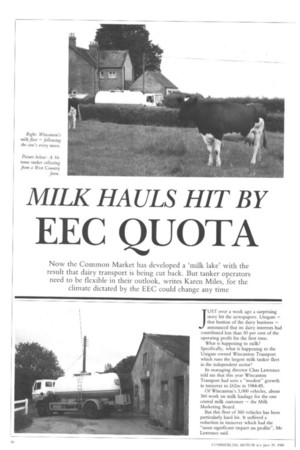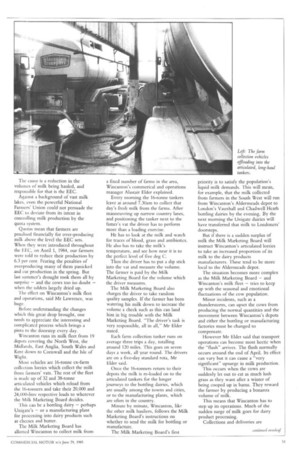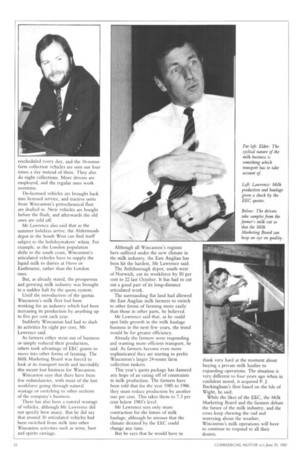MILK HAULS HIT BY
Page 52

Page 53

Page 54

If you've noticed an error in this article please click here to report it so we can fix it.
EEC QUOTA
Now the Common Market has developed a 'milk lake' with the result that dairy transport is being cut back. But tanker operators need to be flexible in their outlook, writes Karen Miles, for the climate dictated by the EEC could change any time
JUST over a week ago a surprising story hit the newspapers. Unigate — that bastion of the dairy business — announced that its dairy interests had contributed less than 50 per cent of the operating profit for the first time.
What is happening to milk? Specifically, what is happening to the Unigate owned Wincanton Transport which runs the largest milk tanker fleet in the independent sector?
Its managing director Chas Lawrence told me that this year Wincanton Transport had seen a "modest" growth in turnover to £62m in 1984-435.
Of Wincanton's 3,000 vehicles, about 360 work on milk haulage for the one central milk customer — the Milk Marketing Board.
But this fleet of 360 vehicles has been particularly hard hit. It suffered a reduction in turnover which had the "most significant impact on profits", Mr Lawrence said. The cause is a reduction in the volumes of milk being hauled, and responsible for that is the EEC.
Against a background of vast milk lakes, even the powerful National Farmers' Union could not persuade the EEC to deviate from its intent in controlling milk production by the quota system.
Quotas mean that farmers are penalised financially for over-producing milk above the level the EEC sets. When they were introduced throughout the EEC, on Aoril 1, 1984, our farmers were told to reduce their production by 6.3 per cent. Fearing the penalties of overproducing many of them panicked and cut production in the spring. But last summer's drought took them all by surprise — and the cows too no doubt — when the udders largely dried up.
The effect on Wincanton's milk fleet and operations, said Mr Lawrence, was huge.
Before. understanding the changes which this great drop brought, one needs to appreciate the interesting and complicated process which brings a pinta to the doorstep every day.
Wincanton runs its milk fleet from 19 depots covering the North West, the Midlands, East Anglia, South Wales and Kent down to Cornwall and the Isle of Wight.
Most vehicles are 16-tonne ex-farm collection lorries which collect the milk from farmers' vats. The rest of the fleet is made up of 32 and 38-tonne articulated vehicles which reload from the 16-tonners and take their 20,000 and 24,000-litre respective loads to wherever the Milk Marketing Board decides.
This can be a bottling dairy — perhaps Unigate's — or a manufacturing plant for processing into dairy products such as cheeses and butter.
The Milk Marketing Board has allotted Wincanton to collect milk from a fixed number of farms in the area, Wincanton's commerical and operations manager Alastair Elder explained.
Every morning the 16-tonne tankers leave at around 7.30am to collect that day's fresh milk from the farms. After manoeuvring up narrow country lanes, and positioning the tanker next to the famer's vat the driver has to perform more than a loading exercise.
He has to look at the milk and watch for traces of blood, grass and antibiotics. He also has to take the milk's temperature, and see how near it is to the perfect level of five deg C.
Then the driver has to put a dip stick into the vat and measure the volume. The farmer is paid by the Milk Marketing Board for the volume which the driver measures.
The Milk Marketing Board also charges the driver to take random quality samples. If the farmer has been watering his milk down to increase the volume a check such as this can land him in big trouble with the Milk Marketing Board. "The driver's task is very responsible, all in all," Mr Elder stated.
Each farm collection tanker runs on average three trips a day, totalling around 120 miles. This goes on seven days a week, all year round. The drivers are on a five-day standard rota, Mr Elder said.
Once the 16-tonners return to their depots the milk is re-loaded on to the articulated tankers for the longer journeys to the bottling dairies, which are usually among the towns and cities, or to the manufacturing plants, which are often in the country.
Minute by minute, Wincanton, like the other milk hauliers, follows the Milk Marketing Board's instructions on whether to send the milk for bottling or manufacture.
The Milk Marketing Board's first priority is to satisfy the population's liquid milk demands. This will mean, for example, that the milk collected from farmers in the South West will run from Wincanton's Aldermeads depot to London's Vauxhall and Chadwell Heath bottling dairies by the evening. By the next morning the Unigate dairies will have transferred that milk to Londoners' doorsteps.
But if there is a sudden surplus of milk the Milk Marketing Board will instruct Wincanton's articulated lorries to take an increased proportion of its milk to the dairy products manufacturers. These tend to be more local to the Aldermeads depot.
The situation becomes more complex as the Milk Marketing Board — and Wincanton's milk fleet — tries to keep up with the seasonal and emotional fluctuations of the cow population.
Minor incidents, such as a thunderstorm, can upset the cows from producing the normal quantities and the movement between Wincanton's depots and either the bottling or manufacturing factories must be changed to compensate.
However Mr Elder said that transport operations can become most hectic when the "flush" arrives. The flush normally occurs around the end of April. Its effect can vary but it can cause a "very significant" upsurge in milk production.
This occurs when the cows are suddenly let out to eat as much lush grass as they want after a winter of being cooped up in barns. They reward the farmer by producing a bonanza volume of milk.
This means that Wincanton has to step up its operations. Much of the sudden surge of milk goes for dairy product processing.
Collections and deliveries are rescheduled every day, and the 16-tonne farm collection vehicles are sent out four times a day instead of three. They also do night collections. More drivers are employed, and the regular ones work overtime.
De-licensed vehicles are brought back into licensed service, and tractive units from Wincanton's petrochemical fleet are drafted in. New vehicles are bought before the flush, and afterwards the old ones are sold off.
Mr Lawrence also said that as the summer holidays arrive, the Aldermeads depot in the South West can find itself subject to the holidaymakers' whim. For example, as the London population shifts to the south coast, Wincanton's articulated vehicles have to supply the liquid milk to dairies at Hove or Eastbourne, rather than the London ones.
But, as already stated, the prosperous and growing milk industry was brought to a sudden halt by the quota system.
Until the introduction of the quotas Wincanton's milk fleet had been working for an industry which had been increasing its production by anything up to five per cent each year.
Suddenly Wincanton had had to slash its activities by eight per cent, Mr Lawrence said.
As farmers either went out of business or simply reduced their production, others took advantage of EEC grants to move into other firms of farming. The Milk Marketing Board was forced to look at its transport needs and inevitably this meant lost business for Wincanton.
Wincanton says that there have been few redundancies, with most of the lost workforce going through natural wastage or switching to other sections of the company's business.
There has also been a natural wastage of vehicles, although Mr Lawrence did not specify how many. But he did say that around 30 articulated vehicles had been switched from milk into other Wincanton activities such as wine, beer and spirits carriage. Although all Wincanton's regions have suffered under the new climate in the milk industry, the East Anglian has been hit the hardest, Mr Lawrence said.
The Attleborough depot, south west of Norwich, cut its workforce by 50 per cent to 22 last October. It has had to cut out a good part of its long-distance articulated work.
The surrounding flat land had allowed the East Anglian milk farmers to switch to other forms of farming more easily than those in other parts, he believed.
Mr Lawrence said that, as he could spot little growth in the milk haulage business in the next few years, the trend would be for greater efficiency.
Already the farmers were responding and wanting more efficient transport, he said. As farmers become even more sophisticated they are starting to prefer Wincanton's larger 24-tonne farm collection tankers.
This year's quota package has damned any hope of an easing off of constraints in milk production. The farmers have been told that for the year 1985 to 1986 they must reduce production by another one per cent. This takes them to 7.3 per cent below 1983's level.
Mr Lawrence secs only more contraction for the future of milk haulage, although he stresses that the climate dictated by the EEC could change any time.
But he says that he would have to
think very hard at the moment about buying a private milk haulier to expanding operations. The situation is very different to four years ago when in confident mood, it acquired P. J. Buckingham's fleet based on the Isle of Wight, he said.
While the likes of the EEC, the Milk Marketing Board and the farmers debate the future of the milk industry, and the cows keep chewing the cud and worrying about the weather, Wincanton's milk operations will have to continue to respond to all their desires.




































































































